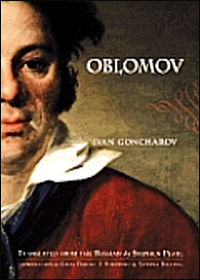Our heroes and their heroes
 ‘Russia
has made three revolutions, and still the Oblomovs have remained... and
he must be washed, cleaned, pulled about, and flogged for a long time
before any kind of sense will emerge’. V. I. Lenin Oblomov is the best
known novel by Russian writer Ivan Goncharov, first published in 1859.
Oblomov is also the central character of the novel, often seen as the
ultimate incarnation of the superfluous man, a symbolic character in
19th-century Russian literature. ‘Russia
has made three revolutions, and still the Oblomovs have remained... and
he must be washed, cleaned, pulled about, and flogged for a long time
before any kind of sense will emerge’. V. I. Lenin Oblomov is the best
known novel by Russian writer Ivan Goncharov, first published in 1859.
Oblomov is also the central character of the novel, often seen as the
ultimate incarnation of the superfluous man, a symbolic character in
19th-century Russian literature.
As Oblamov to Russian literature, Aravinda Jayasena is a very famous
central character to Sri Lankan readership. In his book named Enabling
Traditions, Professor Wimal Dissanayake compares Oblamov to Aravinda
Jayasena of Martin Wickramasinghe’s Viragaya. Oblomov is a young,
generous nobleman who seems incapable of making important decisions or
undertaking any significant actions. Throughout the novel he rarely
leaves his room or bed and famously fails to leave his bed for the first
150 pages of the novel. Aravinda on the other hand is a man who is
attracted to but fearful of life. He possesses a very complex character,
which is bearing a kind indifference. Throughout the novel Viragaya, we
observe Aravinda’s suppression of emotions such as concern, excitement,
motivation and passion.
 |
 |
The book Oblamov was considered a satire of Russian nobility whose
social and economic function was increasingly in question in
mid-nineteenth century Russia. Like Anna Karenina of Tolstoy, it has
been contributed in the rise of Communism in Soviet Russia by presenting
a slice of Russian high life. The novel was wildly popular when it came
out in Russia and a number of its characters and devices have had an
imprint on Russian culture and language. Oblomovism has become word used
to describe someone who exhibits the personality traits of sloth or
inertia similar to the novel’s main character.
With the arrival of Communism, Soviet Russia sought positive heroes
in literature. Marx and Engels insisted, of course that literature,
together with all other products of the human intellect, has its being
within an ideological superstructure, the content of which is ultimately
determined by the economic and political structure of society. In this
perspective, writers were often forced to build a sort of artificial or
fabricated hero characters in their literary works. Soviet literature
held a key role in publicizing this fabricated individual, who may have
resembled real Soviet types, but who, when he appeared in fiction,
tended to confirm to the lineament drawn by the official moralists.
Writers were told where to look for him, what his loyalties would be,
and destiny he would have. Writers were then expected to document this
blueprint to discover bright, persuasive instances of the prescribed
type.
Following the characteristic features of Aravinda Jayasena of
Viragaya, a large number of Oblamovian fictional characters were born in
Sinhala literary canon. As once pointed out by Prof. Somaratne
Balasuriya in one of his book’s preface, Sinhala literature was started
to fill in with characters that were more leisure-loving and apathetic.
On the other hand, most of the protagonists of Sinhala novel
represents the Buddhist culture – and displays Buddhist ideals such as
compassion, empathy and detachment. And some Sinhala fiction reveals the
adverse results of worldly desires. Whatever the aesthetic channel is,
Sinhala creative works remain neutral in representing the image of hero.
Comparing to Indian commercial film industry, Sinhala cinema has
failed to build god like hero images in films. Apparently in every
Indian commercial film, a near superhuman hero is born.
At the same time anti-heroes are also born and within the context of
the film, the good and evil forces are often discussed. Once, there was
a special day to commemorate ‘national heroes’ in Sri Lanka. Remembering
heroic actions of humans is a great way to enhance patriotism of a
nation. Positive heroism represented in fictional or historical
literature largely contributes in making positive mindsets of a nation.
Caption Ivan Goncharov
(FACT BOX) van Aleksandrovich Goncharov * Born: I18 June 1812 * Died:
27 September 1891 (aged 79) * Occupation: Novelist * Nationality:
Russian * Notable work(s): Oblomov (1859) |



